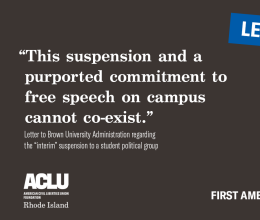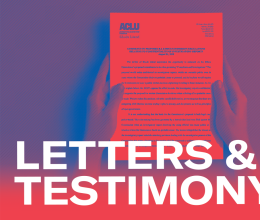In an important religious freedom case, the ACLU of Rhode Island today filed a 49-page brief in the U.S. Court of Appeals in Boston in support of an ACI inmate who has been barred from preaching during Christian religious services at the state prison. The plaintiff, Wesley Spratt, had been preaching at ACI services for seven years before he was unilaterally stopped from doing so in 2003 based on vague and generalized “security” concerns. In June, U.S. District Judge William Smith upheld the state’s ban in a brief three-page opinion, rejecting ACLU arguments that the ban violates a major federal law designed to protect the religious freedom of the institutionalized.
Spratt, who considers his preaching a “calling” from God, had been preaching at religious services on a weekly basis under the supervision, and with the support, of clergy at the ACI. The DOC provided no evidence of security problems during, or as the result of, his supervised preaching during the seven years he had been doing so. Nonetheless, when a new warden took over the maximum security facility in 2003, Spratt was ordered to stop preaching.
Ruling on Spratt’s pro se lawsuit in November 2005, U.S. Magistrate Judge Jacob Hagopian upheld the ban. Notwithstanding the lack of any security problems in the years Spratt had been preaching, Magistrate Hagopian ruled that he would “defer” to the prison’s judgment that there was no means to accommodate Spratt’s preaching while maintaining institutional security. In taking over Spratt’s appeal, the RI ACLU argued earlier this year that the DOC failed to meet the standards of a federal law, known by its acronym RLUIPA, that protects prisoners’ religious freedom. That law bars states from imposing any substantial burden on an inmate’s exercise of religion unless it furthers a compelling interest and is the least restrictive means available. Judge Smith called the case “a close call,” but upheld the ban.
In the ACLU’s brief to the First Circuit, ACLU volunteer attorney Lynette Labinger notes: “Three years have passed since Wesley Spratt was able to expound upon the scriptures under the watchful eye of an ACI chaplain. Preaching is not inherently or presumptively dangerous; it involves no contraband. Its prohibition here results not from application of a neutral restriction which has the unintended effect of interfering with a religious practice, but from a restriction aimed at the religious practice itself. RLUIPA commands a critical and skeptical assessment of such a blanket prohibition: that is the essence of ‘strict scrutiny.’ Based upon the express dictates of RLUIPA and Supreme Court precedent, Spratt is entitled to judgment in his favor and an immediate restoration of his right to preach under supervision.”
RI ACLU executive director Steven Brown said today: “In enacting RLUIPA, Congress recognized the importance of protecting the rights of the institutionalized to practice their faith without being completely at the mercy of indifferent officials and arbitrary rules. We are hopeful that the First Circuit will also recognize that importance and restore Mr. Spratt’s right to preach.”







